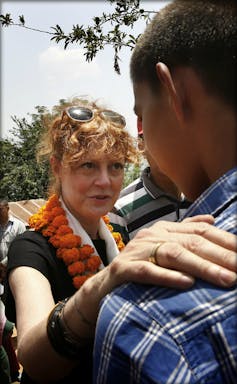Holidaying in a disaster zone isn't as crazy as it might seem
- Written by David Beirman, Senior Lecturer, Tourism, University of Technology Sydney
Holidaying in a disaster zone might seem crazy, but “volunteer tourism” can actually help communities recover from natural disasters.
And if can offer a unique and rewarding experience for volunteers, if done carefully.
When disaster hits a tourist destination – whether fire, flood, cyclone or earthquake – tourists usually stay away, leaving communities to deal with a loss of income on top of the costs of repair and recovery.
On the other hand, people who feel a natural curiosity, as well as a natural desire to help, are keen for experiences where they can interact with locals and make a difference.
This “volunteer tourism” should not be confused with “disaster tourism” in which tourists immediately travel to a scene not to help but to look.
Nepal shows what can be done
We examined volunteer tourism in Nepal in the wake of the April 2015 earthquake that killed nearly 9,000 people and injured nearly 22,000.
We found that when it was done in an ethical manner that considered local conditions and the community, it could aid recovery and resilience.
It is important that the process be controlled locally and that the invitation from locals be genuine. It is also important that volunteer tourists be prepared to engage in work that mainstream tourists would not.
Our study, Engaging volunteer tourism in post-disaster recovery in Nepal[1], has just been published in the Annals of Tourism Research.
Read more: Danger in paradise: resurrecting tourism after natural disasters[2]
In the four months that followed the Nepal earthquake, international tourism more than halved.
Initially most relief organisations asked international volunteers not to come unless they had specific expertise, such as medical skills, building skills, or experience responding to emergencies.
Then the Pacific Asia Travel Association and Nepalese tourism industry leaders worked together to produce the report of the Nepal Rapid Recovery Task Force[3], running workshops with more than 200 tourism industry leaders and professionals.
Volunteer tourism led the way back
The strategy they came up with prioritised potential tourism regrowth markets, including volunteer tourism.
Nepal relaxed conditions to allow international tourists to volunteer on a wide range of projects including rebuilding homes and schools, interning in hospitals, supporting non-government organisations and reestablishing sustainable agriculture.
It helped that Nepal was set up for it. It had already hosted organisations offering short-term travellers the opportunity to teach English and to work on health projects.
In 2015 and 2016 it hosted three global celebrities whose widely-publicised visits raised the profile and popular appeal of Nepal, especially to volunteer tourists.
 US actress Susan Sarandon comforts Kanti Maya Tamang, who lost her husband and daughter during the earthquake in Ramkot village on the outskirt of Kathmandu, Nepal in May 2015.
NARENDRA SHRESTHA/EPA
US actress Susan Sarandon comforts Kanti Maya Tamang, who lost her husband and daughter during the earthquake in Ramkot village on the outskirt of Kathmandu, Nepal in May 2015.
NARENDRA SHRESTHA/EPA
In May 2015, Hollywood actress Susan Sarandon visited Nepal and actively promoted volunteer tourism to the North American market.
In mid-2015 Hong Kong based actor Jackie Chan visited and encouraged Chinese tourists and volunteers to come to Nepal.
In March 2016, Prince Harry (the younger son of Prince Charles) spent two weeks in Nepal engaged in volunteer programs.
Nepal’s tourism recovery since then has been remarkable.
In 2015, the year of the earthquake, just under 600,000 international tourists visited.
By 2018 the number had reached an all time record of almost 1.2 million. In 2019 it grew further. Volunteer tourism drove the recovery.
The Nepal Association of Tour and Travel Agents says almost one third of the tours booked to Nepal in the two years after the earthquake comprised groups who combined tourism experiences with volunteering or philanthropy.
It needs to meet local needs
In times of national crisis, the priority of a government has to be restoring the welfare of its people. However, the process by which that happens is multifaceted. In destinations that rely on tourism as a primary source of foreign investment, it can make sense to build tourism into the recovery process.
A focus on tourism need not detract from other critical processes such as providing health care and emergency services, clearing debris and construction.
Read more: Volunteer tourism: what's wrong with it and how it can be changed[4]
But that’s easier said than done. Natural disasters by their very nature sow confusion, severely damage infrastructure and impose great strains on emergency management and administration.
Volunteer tourism won’t work everywhere, but where conditions are right, international visitors can speed rather than slow recovery.
References
- ^ Engaging volunteer tourism in post-disaster recovery in Nepal (www.sciencedirect.com)
- ^ Danger in paradise: resurrecting tourism after natural disasters (theconversation.com)
- ^ Nepal Rapid Recovery Task Force (pata.org.np)
- ^ Volunteer tourism: what's wrong with it and how it can be changed (theconversation.com)
Authors: David Beirman, Senior Lecturer, Tourism, University of Technology Sydney
Read more http://theconversation.com/holidaying-in-a-disaster-zone-isnt-as-crazy-as-it-might-seem-128841







